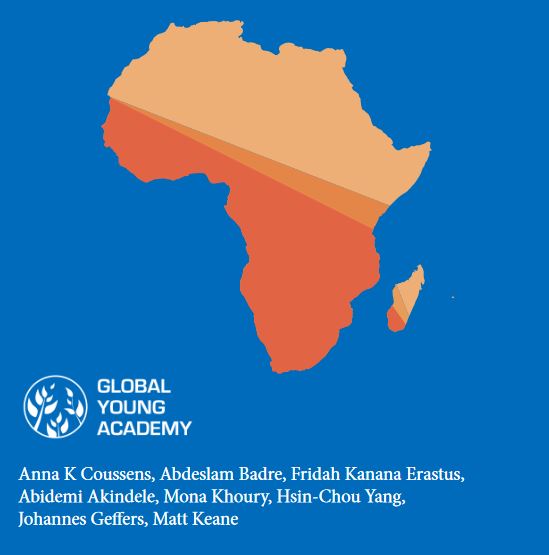The GYA is excited to share that the Global State of Young Scientist (GloSYS) Africa Main Report has been published. The report provides a comprehensive analysis of the experiences and challenges faced by Early-Career Researchers (ECRs) in Africa, with an aim to advise policy for science, and contribute to scholarly discussions in the field of higher education research.
The GloSYS Africa Main Report analyses survey responses from ECRs born in 42 of the 54 African nations, as well as African nationals living outside of Africa. Additionally, survey respondents in 14 pre-selected focus countries (Cameroon, Egypt, Ghana, Kenya, Mauritius, Morocco, Mozambique, Nigeria, Rwanda, Senegal, South Africa, Tunisia, Uganda and Zimbabwe) were interviewed.
Interview data contributed to the interpretation of survey results in the GloSYS Africa Main Report, as well as to a separately published narrative report on career trajectories in Africa, see Voices of Early Career Researchers in and out of the Academy: A PanAfrican Perspective.
The report addresses trends in higher education on the African continent, and in this context,
- ECRs’ motivations to pursue a research career
- their career satisfaction and workload
- inequities in research
- mentoring
- the funding landscape, and
- international mobility
GloSYS Africa builds on previous GloSYS studies undertaken by the GYA that all share a methodological framework, adapted to the specific regional context, aiming to provide crucial data for regional comparisons and to inform science policy.
GloSYS Africa identifies a high motivation of ECRs to engage in research, and a desire to contribute to societal development. Despite this enthusiasm, 80 per cent of respondents considered leaving Africa to continue their careers, and approximately 60 per cent considered leaving their employment for a different sector.
Some of the challenges ECRs face highlighted in the Main Report include:
- job security
- a heavy teaching load with not enough time and resources to pursue excellent research
- inequalities in the research system particularly experienced by female researchers, and
- lacking resources and support for international mobility
- formal mentorship is widespread but not always of high quality or readily available
Science Policy Recommendations
The GloSYS Africa Main Report offers science policy recommendations for African higher education and research institutions and academies, as well as international research funding bodies, focused on these main themes:
- Support Open Data policies to make research data equally available to ECRs across the continent
- Retain researchers by improving ECRs’ working conditions and by improving research evaluation mechanisms to focus on quality of achievements.
- Enhance funding opportunities through increased availability of grants specifically targeted at ECRs, and increasing administrative support for funding applications.
- Improve support systems for ECRs through quality improvement of mentoring, and particular attention to promoting gender equality in research institutions.
- Increase international research collaborations and exchanges, and address barriers such as visa restrictions and lack of funding for international travel.
These recommendations aim to create a more supportive and equitable environment for ECRs in Africa, to contribute to a growing research landscape on the continent and to the global scientific community.
A launch event for the GloSYS Africa Main Report is in the planning stages – stay tuned for more information!
